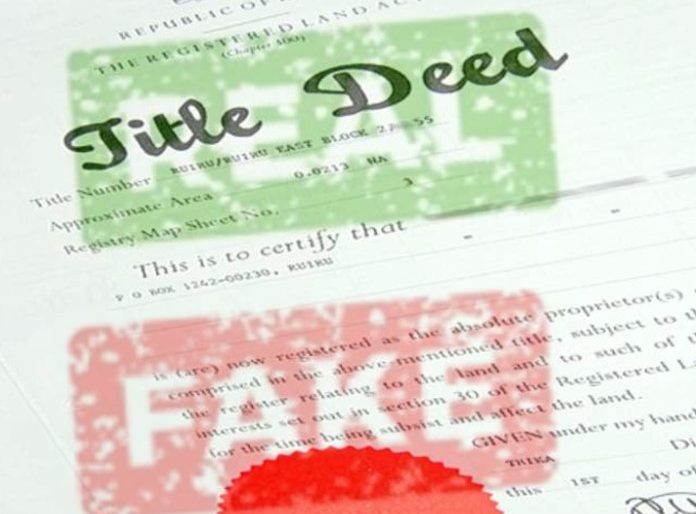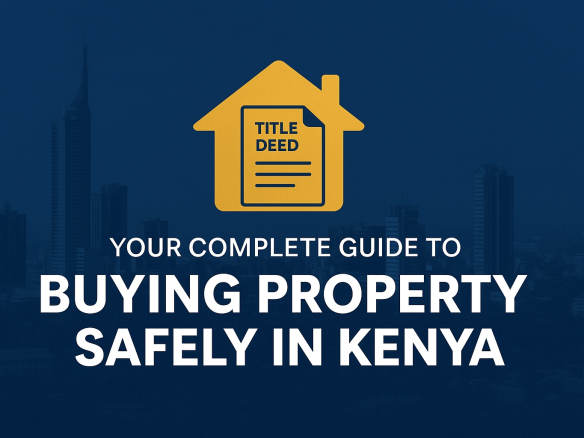The Process of Title Verification in Kenya
Title verification in Kenya is the legal and procedural process of confirming the authenticity, validity, and ownership status of a land title deed. It ensures that the property you intend to buy or invest in is legitimately registered, free from encumbrances, and owned by the rightful person or entity.
This process protects buyers, investors, and financial institutions from fraudulent transactions, double ownership, or fake title deeds — issues that are unfortunately common in Kenya’s property market.
Below is a step-by-step guide to the title verification process in Kenya, designed to help you perform due diligence before purchasing land or property.
1. Obtain a Copy of the Title Deed
The first step is to request a copy of the title deed from the seller. You’ll need the Land Reference (L.R.) number or Title Number for verification purposes.
The details on the title deed should include:
The registered owner’s name
The parcel number and location
The size and tenure (freehold or leasehold)
Any encumbrances or restrictions registered against it
Ensure that the copy matches the property being sold — both physically and legally. Any inconsistencies should raise red flags and prompt further investigation.
2. Conduct an Official Search at the Lands Registry
Next, perform an official land search at the relevant Lands Registry, either manually or online via the ArdhiSasa portal (for Nairobi and select counties).
How to do a land search in Kenya:
Visit the Ministry of Lands and Physical Planning office (or use ArdhiSasa online).
Fill in a search application form and attach a copy of the title deed.
Pay the official search fee (usually Kshs. 500 – 1,500).
The search results are typically ready within 1–3 working days.
The search certificate will reveal:
The current registered owner of the land.
Any charges, caveats, or encumbrances (e.g., if the land is used as loan security).
The size, tenure, and location of the property.
If the seller’s name doesn’t match the one on the search certificate, do not proceed until clarification is provided.
3. Verify Land Rent and Rates Clearance
Every legitimate land title should be up-to-date on land rent and rates payments.
For leasehold properties, confirm that land rent has been paid at the Ministry of Lands (Ardhi House).
For freehold properties, ensure that county rates have been cleared with the respective County Government.
Request Land Rent Clearance Certificates and Rates Clearance Certificates. These documents prove that the seller has settled all statutory obligations — a requirement before transfer.
4. Confirm the Authenticity of the Title Deed
After obtaining search results, visit the Lands Registry to verify the authenticity of the title deed. Unscrupulous sellers may present forged titles, so it’s crucial to confirm that the document is genuine and recorded in government records.
At the registry, officials can cross-check the title number against manual records or the digital register (ArdhiSasa). If discrepancies appear in the serial number, format, or stamp seal, it may indicate a forged or altered title.
Tip: A legitimate title deed should have:
An official seal of the Lands Registry
A unique serial number
Watermark and security features
Correct signatures and official stamps
5. Conduct a Survey and Beacon Verification
To ensure the title deed matches the physical land boundaries, engage a licensed surveyor to perform a beacon identification and verification exercise.
The surveyor will:
Confirm that the land reference number corresponds to the property on the ground.
Identify and re-establish boundary beacons.
Check that the parcel size and shape match the title deed and survey map.
This step prevents disputes over encroachment, boundary overlaps, or illegal subdivisions, which are common issues in land transactions.
6. Check for Caveats, Easements, or Restrictions
A caveat is a legal notice registered against a title deed, preventing any transaction until a specific claim or dispute is resolved.
During verification, request confirmation from the Lands Registry on whether any caveats, cautions, easements, or restrictions exist on the property.
If such entries are found, it may mean the land:
Is under dispute or litigation.
Has been used as collateral for a loan.
Is jointly owned or under succession.
Never proceed with purchasing land that has unresolved caveats or claims.
7. Verify the Seller’s Identity and Ownership Capacity
Ensure the seller is the registered owner listed on the title deed and the search certificate. Request to see their:
National ID and KRA PIN
Company registration documents (if a company is selling)
Letters of Administration or Grant of Probate (if selling inherited land)
Compare the details with the title and official search records. This step helps prevent identity fraud and illegal land transfers.
8. Engage a Registered Valuer or Conveyancing Advocate
Finally, hire a registered property valuer or conveyancing advocate to guide you through the legal and technical aspects of verification. These professionals can:
Confirm the market value of the property.
Interpret complex title entries and registry notations.
Identify risks or irregularities before signing any agreement.
Ensure all documentation is properly executed during transfer.
Working with qualified professionals guarantees that your investment is legally sound and fully compliant with Kenyan property laws.
The title verification process in Kenya is an essential step before buying or transferring land. It ensures that the property is genuine, unencumbered, and rightfully owned by the seller.
Through proper due diligence — including land searches, survey verification, and registry checks — buyers can confidently invest in property without fear of fraud or ownership disputes.
For the most reliable results, always work with registered valuers, property consultants, and conveyancing advocates who specialize in land verification and property transfer services in Kenya.
Frequently Asked Questions (FAQs) on Title Verification in Kenya
1. What is title verification in Kenya?
Title verification is the legal process of confirming the authenticity, validity, and ownership of a land title deed to ensure that the property is genuine and free from disputes.
2. Why is title verification important before buying land?
It protects buyers from fraud, fake titles, double ownership, and illegal land sales by confirming the rightful owner and property details before purchase.
3. Where can I verify a land title in Kenya?
Title verification can be done at the Ministry of Lands and Physical Planning or online via the ArdhiSasa portal for Nairobi and select counties.
4. What documents are needed for title verification?
You’ll need a copy of the title deed, Land Reference (L.R.) number, national ID, and sometimes a PIN certificate for official searches.
5. How long does a land search take in Kenya?
A manual land search takes about 2–3 working days, while an online search on ArdhiSasa may be instant once payment is confirmed.
6. How much does it cost to verify a title deed in Kenya?
An official land search costs Kshs. 500 – 1,500/-, but engaging a lawyer or valuer for full verification may range between Kshs. 15,000–25,000, depending on scope.
7. What is a Land Reference (L.R.) number?
The L.R. number is a unique identifier assigned to every registered land parcel in Kenya, used to trace ownership and records at the Lands Registry.
8. Can I verify a title deed online in Kenya?
Yes. You can use the ArdhiSasa platform (www.ardhisasa.lands.go.ke) to conduct a title search, view ownership details, and verify authenticity.
9. What is a title deed search certificate?
It’s an official document issued by the Lands Registry confirming the property’s ownership, size, tenure, and any registered encumbrances.
10. What are encumbrances on a title deed?
Encumbrances include charges, caveats, restrictions, or liens that affect ownership or transfer rights of a property.
11. What is a caveat on land in Kenya?
A caveat is a legal notice placed on a title to prevent transactions until a claim or dispute over the property is resolved.
12. How can I check if a land title is genuine?
Verify the title deed at the Lands Registry, check its serial number, security features, and ensure the official search results match the physical document.
13. What is the difference between freehold and leasehold land?
Freehold land gives perpetual ownership, while leasehold land is owned for a specific period (e.g., 99 years) and requires renewal after expiry.
14. Can a forged title deed be registered?
No. Once detected, forged or fraudulent title deeds are invalidated by the Lands Registry and may lead to legal action against the parties involved.
15. How can I confirm if land rent and rates are paid?
Request Land Rent Clearance Certificates from the Ministry of Lands and Rates Clearance Certificates from the county government.
16. Who is a licensed surveyor in Kenya?
A licensed surveyor is a professional registered under the Land Surveyors Board of Kenya to conduct land surveys and beacon verification.
17. Why is beacon verification necessary?
Beacon verification ensures that the boundaries and size of the land match the details on the title deed and official survey map.
18. What happens if boundaries don’t match the title deed?
Inconsistencies should be reported to the surveyor or Lands Registry for rectification before proceeding with any transaction.
19. Can a title deed have multiple owners?
Yes. Some properties are registered under joint ownership or tenancy in common, where each owner’s share is specified on the title.
20. What is a Rates Clearance Certificate?
It’s a document issued by a county government confirming that all property rates have been fully paid and cleared by the owner.
21. What is Land Rent Clearance?
Land Rent Clearance confirms that the landowner has fully paid land rent dues for leasehold property to the Ministry of Lands.
22. How do I know if there’s a court case on a property?
Conduct a check at the Environment and Land Court (ELC) or request your lawyer to search court records related to the property.
23. Who can assist with title verification in Kenya?
Registered valuers, real estate consultants, surveyors, and conveyancing advocates are the best professionals to assist.
24. What is the ArdhiSasa platform?
ArdhiSasa is Kenya’s official online land management system that allows users to access land records, conduct searches, and process title transactions digitally.
25. Can a buyer conduct title verification without a lawyer?
Yes, but it’s strongly advised to involve a qualified advocate to ensure all legal requirements and verifications are properly executed.
26. What are common signs of a fake title deed?
Fake titles often have missing seals, altered fonts, incorrect serial numbers, or discrepancies between the document and registry records.
27. What is a conveyancing advocate?
A conveyancing advocate is a lawyer specializing in property transactions, including sale agreements, title verification, and property transfers.
28. Can a title deed be replaced if lost or damaged?
Yes. You can apply for a replacement (reconstruction) at the Lands Registry by providing an affidavit, police abstract, and ownership proof.
29. What is the role of a valuer in title verification?
A registered valuer verifies the property’s market value, assesses encumbrances, and ensures the title corresponds to the actual property.
30. How do I ensure safe property transactions in Kenya?
Always verify titles at the Lands Registry, check all supporting documents, and engage registered professionals before making payments.





Join The Discussion